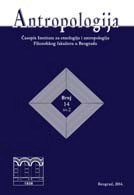DOES POLE DANCING STRENGTHEN OR HINDER WOMEN’S RIGHTS? ANALYSING THE CHANGING DISCOURSE ON POLE DANCING AS A RECREATIONAL ACTIVITY
DOES POLE DANCING STRENGTHEN OR HINDER WOMEN’S RIGHTS? ANALYSING THE CHANGING DISCOURSE ON POLE DANCING AS A RECREATIONAL ACTIVITY
Author(s): Sara PetrovskiSubject(s): Theatre, Dance, Performing Arts, Gender Studies, Social Norms / Social Control
Published by: Институт за етнологију и антропологију
Keywords: Pole dancing; recreational activity; human rights; women’s rights; culture;
Summary/Abstract: This paper critically reviews contemporary academic and public understandings of the changing discourse on pole dancing following its shift from a sex industry related activity to sports. Through an ethnographic approach, combined with a desk review of scarce academic literature related to pole dancing, I analyse whether pole dancing as a recreational activity strengthens or undermines women’s rights. My conclusions indicate that either pole dancing fitness classes should be observed only through the lenses of pornographic culture, as an activity inevitably perpetuating misogyny and sexism, nor would forcefully “whitewashing” them from any notion of sensuality automatically make pole dance empowering. From an anthropological and human rights perspective, this research stresses how posing our own assumptions or even prejudices on others is not only intellectually limited but can also be “objectively” dangerous and discriminating. Simple minded advocacy for women’s emancipation and attacks on “unacceptable” practices, like pole dancing, mostly presents a hegemony over id eas on gender, sexuality, liberation and empowerment. While imposing those static definitions of subordination and inequality on pole dancing and its participants, critics often end up in embracing them rather than deconstructing them.
Journal: Antropologija
- Issue Year: 21/2021
- Issue No: 3
- Page Range: 35-63
- Page Count: 29
- Language: English

